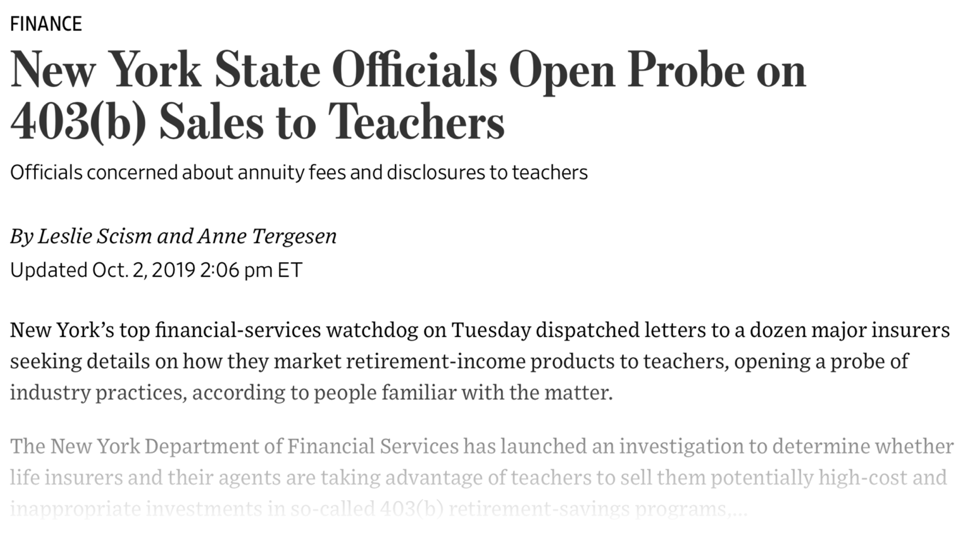Retirement plan sponsors aren’t required to have an Investment Policy Statement (IPS) for their plan. However, having a written statement in place can facilitate your organization’s plan meeting federal and state regulations and fulfilling the fiduciary duties of a plan sponsor and/or their committee. However, not all policy statements are created equal, and there are a few topics every IPS should cover. Learn about what should be included in an effective Investment Policy Statement and how a well-crafted IPS can lighten the load of a committee that’s tasked with difficult plan decisions.
403(b) Sales Practices in Question
Over the past few months, we have seen several news stories that raised concerns about insurance companies and their retirement plan sales practices. For example, here is an article that was published in late 2019 by The Wall Street Journal:

Based on the investigations that have reportedly been launched by the New York Department of Financial Services, as well as the Securities and Exchange Commission (SEC), how should retirement plan sponsors respond?
Are You a Fiduciary?
Administering a retirement plan and managing its assets requires certain actions and involves specific fiduciary responsibilities. If you make decisions that impact your organization’s retirement plan, you’re likely considered a fiduciary under the Employee Retirement Income Security Act of 1974 (ERISA). With the current scrutiny over retirement plan litigation, it is imperative that plan fiduciaries understand their responsibilities and adhere to ERISA’s standards. Learn more about who is considered a fiduciary, their fiduciary responsibilities, and how to fulfill their responsibilities to their participants.
The SECURE Act is Now Law
Although U.S. stock indexes are hovering at or near all-time highs, many American workers still aren’t financially secure enough to retire. In response, the Setting Every Community Up for Retirement Enhancement (SECURE) Act focuses on promoting lifetime income options like annuities within a 401(k) and incentivizing businesses to expand their retirement offerings like auto enrollment. The Act also liberalizes the existence of Multiple Employer Plans (MEPs) for plan sponsors to pool their investments and plan administration usually at a cost savings.
This Act officially became law in December 2019, marking one of the most comprehensive retirement reform packages employers have seen in years. What should plan sponsors and participants know about these changes?
Why You Should Hire a 3(38) Fiduciary
For many plan sponsors, designating an ERISA 3(38) investment manager to manage, select, and monitor the retirement plan’s investments can be beneficial. It allows the plan sponsor to have more time and attention to focus on other aspects of the organization along with managing tasks that are otherwise difficult to outsource. There are many benefits if you decide to hire a 3(38) fiduciary, but it’s important to understand the advantages (and disadvantages) of their role and the questions you should ask when vetting an investment advisor/manager to take on the role for your retirement plan.
- « Previous Page
- 1
- 2
- 3
- 4
- …
- 10
- Next Page »





